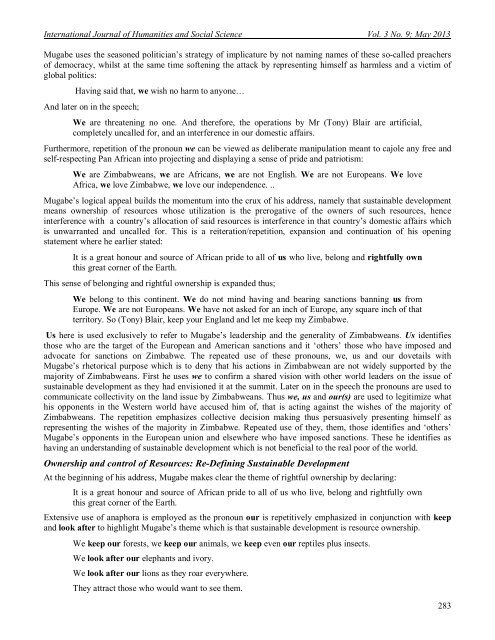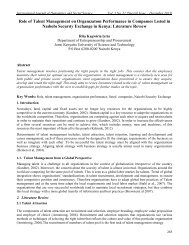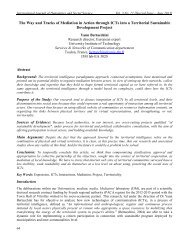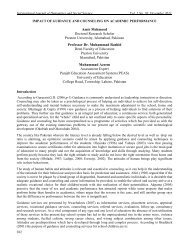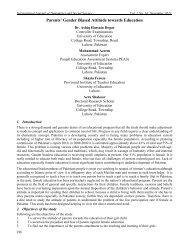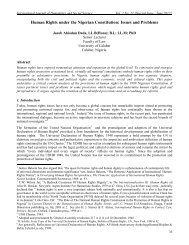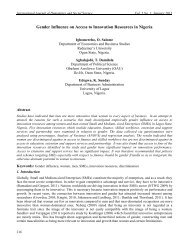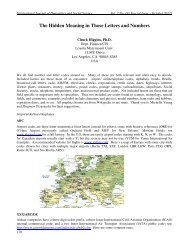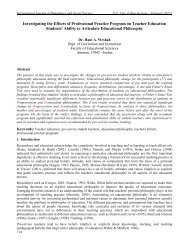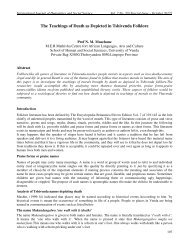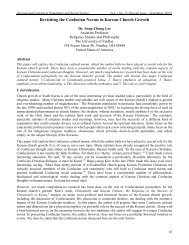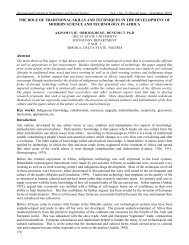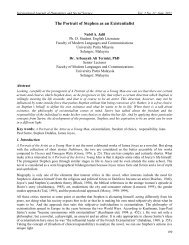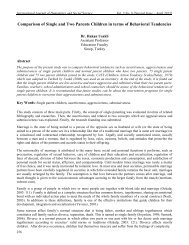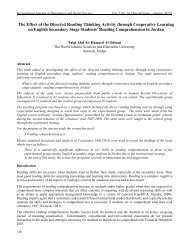A Critical Discourse Analysis of President Mugabe's 2002 Address ...
A Critical Discourse Analysis of President Mugabe's 2002 Address ...
A Critical Discourse Analysis of President Mugabe's 2002 Address ...
You also want an ePaper? Increase the reach of your titles
YUMPU automatically turns print PDFs into web optimized ePapers that Google loves.
International Journal <strong>of</strong> Humanities and Social Science Vol. 3 No. 9; May 2013<br />
Mugabe uses the seasoned politician’s strategy <strong>of</strong> implicature by not naming names <strong>of</strong> these so-called preachers<br />
<strong>of</strong> democracy, whilst at the same time s<strong>of</strong>tening the attack by representing himself as harmless and a victim <strong>of</strong><br />
global politics:<br />
Having said that, we wish no harm to anyone…<br />
And later on in the speech;<br />
We are threatening no one. And therefore, the operations by Mr (Tony) Blair are artificial,<br />
completely uncalled for, and an interference in our domestic affairs.<br />
Furthermore, repetition <strong>of</strong> the pronoun we can be viewed as deliberate manipulation meant to cajole any free and<br />
self-respecting Pan African into projecting and displaying a sense <strong>of</strong> pride and patriotism:<br />
We are Zimbabweans, we are Africans, we are not English. We are not Europeans. We love<br />
Africa, we love Zimbabwe, we love our independence. ..<br />
Mugabe’s logical appeal builds the momentum into the crux <strong>of</strong> his address, namely that sustainable development<br />
means ownership <strong>of</strong> resources whose utilization is the prerogative <strong>of</strong> the owners <strong>of</strong> such resources, hence<br />
interference with a country’s allocation <strong>of</strong> said resources is interference in that country’s domestic affairs which<br />
is unwarranted and uncalled for. This is a reiteration/repetition, expansion and continuation <strong>of</strong> his opening<br />
statement where he earlier stated:<br />
It is a great honour and source <strong>of</strong> African pride to all <strong>of</strong> us who live, belong and rightfully own<br />
this great corner <strong>of</strong> the Earth.<br />
This sense <strong>of</strong> belonging and rightful ownership is expanded thus;<br />
We belong to this continent. We do not mind having and bearing sanctions banning us from<br />
Europe. We are not Europeans. We have not asked for an inch <strong>of</strong> Europe, any square inch <strong>of</strong> that<br />
territory. So (Tony) Blair, keep your England and let me keep my Zimbabwe.<br />
Us here is used exclusively to refer to Mugabe’s leadership and the generality <strong>of</strong> Zimbabweans. Us identifies<br />
those who are the target <strong>of</strong> the European and American sanctions and it ‘others’ those who have imposed and<br />
advocate for sanctions on Zimbabwe. The repeated use <strong>of</strong> these pronouns, we, us and our dovetails with<br />
Mugabe’s rhetorical purpose which is to deny that his actions in Zimbabwean are not widely supported by the<br />
majority <strong>of</strong> Zimbabweans. First he uses we to confirm a shared vision with other world leaders on the issue <strong>of</strong><br />
sustainable development as they had envisioned it at the summit. Later on in the speech the pronouns are used to<br />
communicate collectivity on the land issue by Zimbabweans. Thus we, us and our(s) are used to legitimize what<br />
his opponents in the Western world have accused him <strong>of</strong>, that is acting against the wishes <strong>of</strong> the majority <strong>of</strong><br />
Zimbabweans. The repetition emphasizes collective decision making thus persuasively presenting himself as<br />
representing the wishes <strong>of</strong> the majority in Zimbabwe. Repeated use <strong>of</strong> they, them, those identifies and ‘others’<br />
Mugabe’s opponents in the European union and elsewhere who have imposed sanctions. These he identifies as<br />
having an understanding <strong>of</strong> sustainable development which is not beneficial to the real poor <strong>of</strong> the world.<br />
Ownership and control <strong>of</strong> Resources: Re-Defining Sustainable Development<br />
At the beginning <strong>of</strong> his address, Mugabe makes clear the theme <strong>of</strong> rightful ownership by declaring:<br />
It is a great honour and source <strong>of</strong> African pride to all <strong>of</strong> us who live, belong and rightfully own<br />
this great corner <strong>of</strong> the Earth.<br />
Extensive use <strong>of</strong> anaphora is employed as the pronoun our is repetitively emphasized in conjunction with keep<br />
and look after to highlight Mugabe’s theme which is that sustainable development is resource ownership.<br />
We keep our forests, we keep our animals, we keep even our reptiles plus insects.<br />
We look after our elephants and ivory.<br />
We look after our lions as they roar everywhere.<br />
They attract those who would want to see them.<br />
283


